Top health tips from the women shaping Simple’s science
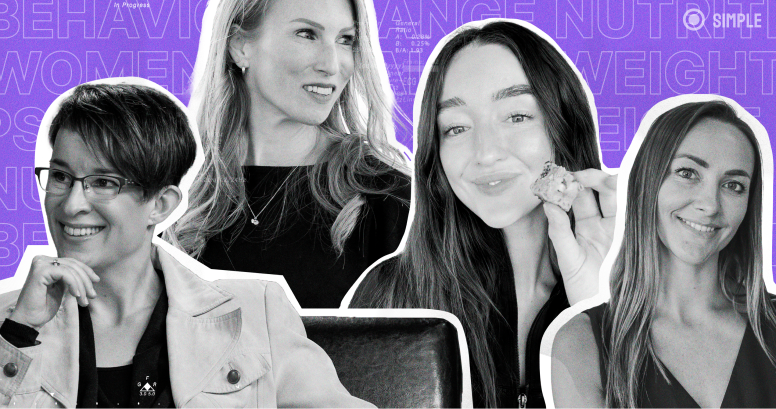
Hey, I’m Ro, Chief Nutrition Officer at Simple. [waves] Today, we’re here to celebrate — and learn from — some of the brilliant women shaping the science at Simple.
It seemed like the perfect opportunity, given all these relevant cultural holidays:
- International Day of Women and Girls in Science (Feb 11th)
- International Women’s Day (March 8th)
- National Registered Dietitian Nutritionist Day (March 13th)
(Though really, there’s no excuse needed to celebrate awesome women working in STEM subjects and kicking butt in the world of science!)
Not all scientists wear lab coats
We don’t work in a lab or spend our time exploding things over a bunsen burner (well, maybe in our spare time, just not at work), but together, Krista, Josie, Mariane, and I make sure that the Simple app is powered by the most accurate, up-to-date science, by:
- infusing our app and content with tried-and-tested behavior change techniques and dietary guidelines
- training Avo to coach safely, effectively, and with real human warmth
- constantly updating our evidence base
and much more. (With the help of the other experts on our team, of course.)
Ready to hear our thoughts on all things science, nutrition, and Simple? Let’s go!

Busting myths and misconceptions
[Ro] The health industry is full of false and confusing ideas. At Simple, we aim to always be clear and truthful so, let’s start by exploding some myths.
[Ro] What misconception about weight loss most grinds your gears?
[Mariane] The belief that weight loss can be achieved quickly through fad diets. Sustainable weight loss is about adopting a healthy lifestyle and establishing consistent habits.
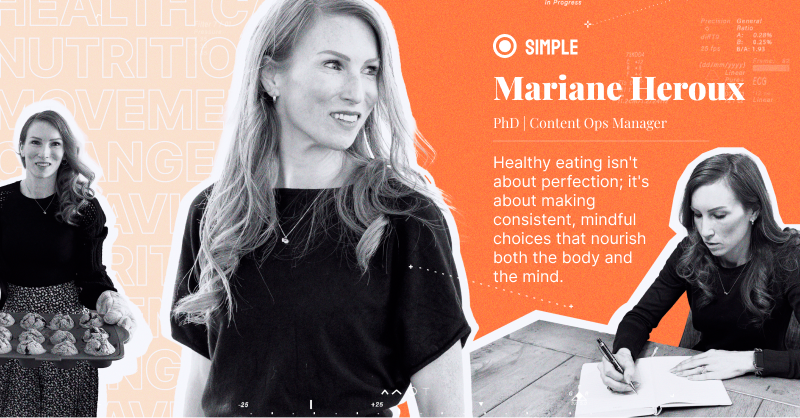
[Krista] Right? And it doesn’t have to be complicated. The behaviors are very simple — the issue is that they can be difficult to do consistently. Another misconception is that it’s all about “motivation” or “willpower”. While those are important, our environment and routines are huge influences on our behavior. If we aren’t aware of how they affect us — and don’t know how to change them — we’ll keep struggling and not know why.
[Josie] For me, it’s the idea that people have to reach a “normal” body mass index (BMI). While this may help to reduce the risk of conditions like heart disease and type 2 diabetes, BMI is just one aspect in a much bigger picture. I prefer to help people aim to lose 5% of their body weight. This is clinically significant, because it’s around here that we start seeing improvements to blood pressure, insulin sensitivity, mobility, and more.
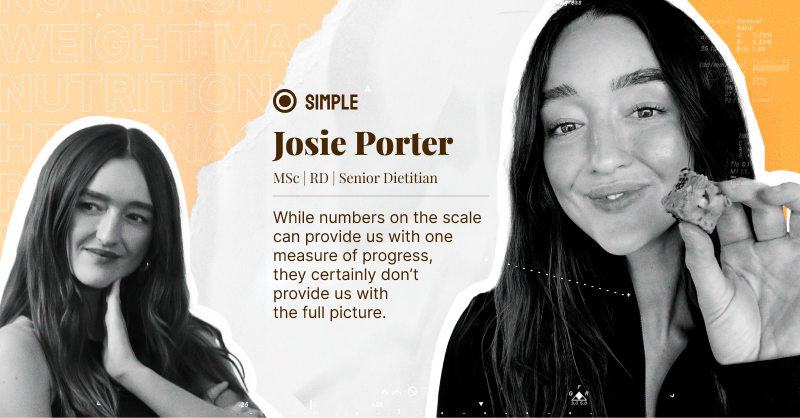
[Ro] What’s the biggest misconception about healthy eating, in your opinion?
[Krista] That good nutrition and healthy eating has to taste bad or flavorless or depressing.
[Josie] Yes! And it’s so common for people to think they need to cut out foods or food groups like carbs, ultra-processed foods, sugar, or gluten. Healthy eating is about making informed and mindful choices across all foods — even ones often labeled as “bad”. (There’s no such thing as a “bad” food!)
[Ro] Our science team at Simple is a great example of how a career in science doesn’t always mean working in a lab. What’s another common misconception about our profession?
[Krista] That because the field evolves, it means that “science doesn’t know anything”. I think we’ve seen a dangerous emergence of distrust in expertise, the idea that science is a conspiracy that’s out to make things more complicated, or that anyone can just “do their own research” and discover something that millions of scientists have somehow missed.
[Josie] For me — the idea that dietitians are the food police. It’s not true! Our mission is to empower people to build a positive and sustainable relationship with food. No judgment, no rules, no food-shaming. After all, dietitians eat cake too!
Top tips for reaching your health goals with Simple
[Ro] Alright, let’s talk Simple! What are your top tips to help people reach their health goals with Simple?
I’ll go first: Use the app every day. We find that those who use Simple frequently are more successful in achieving their weight loss goals.
[Mariane] Mine would be: Remember that health and wellness are about progress, not perfection. Whether you’re making healthier food choices, sticking to your fasting schedule, or increasing your daily steps, every positive step counts towards your overall well-being.
[Krista] For me, it’s this: Allow yourself to go slowly. Try one small change at a time and focus on it. Practice it over and over. Then, when that feels solid, try another. Don’t try to make a bunch of changes all at once.
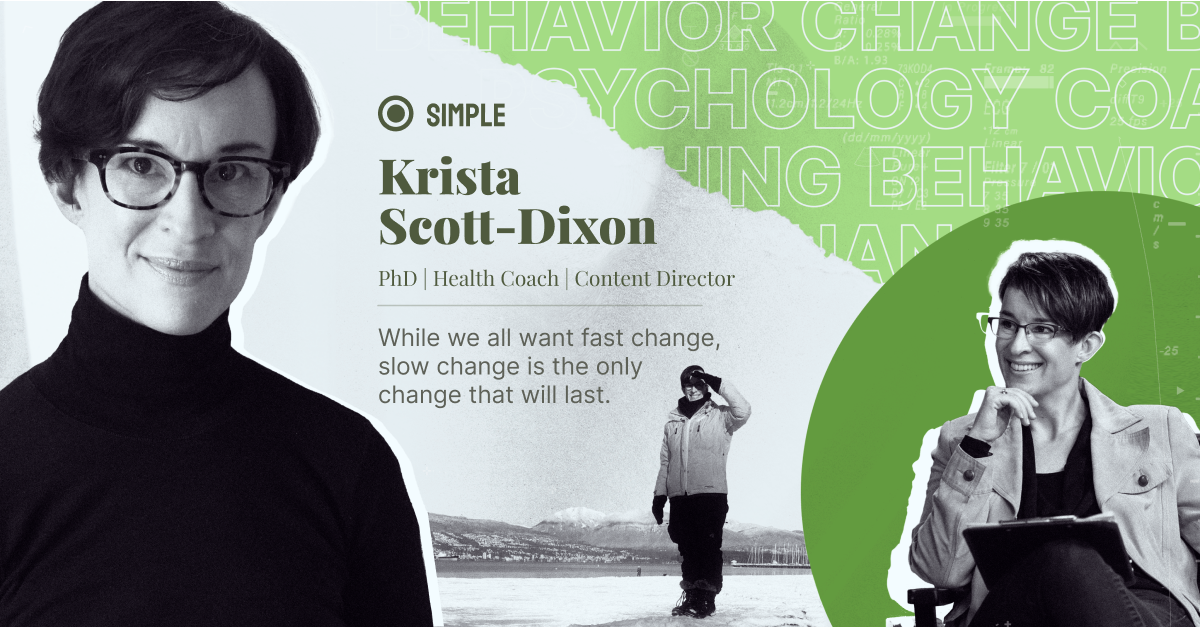
[Josie] I agree with all of those! Let’s see — my addition is: Prioritize planning! Dedicate time to plan your meals and movement for the week ahead. It’ll help you manage your time and reduce the stress of last-minute decisions, like deciding what to eat for dinner after a hectic day.
Favorite Simple feature
[Ro] Obviously all our app features are based on strong science, but if you had to choose, which would be your favorite?
[Mariane] For me, it’s Nutrition Scores. I like how it shifts the focus away from counting calories or tracking macros and encourages users to think about the overall nutritional quality of their meals and snacks, including things like vitamins, minerals, and fiber.
[Krista] I like Nutrition Scores too. Rather than focusing on what not to do, Nutrition Scores guides you towards what to do — i.e. what healthy changes you could make to boost the quality of what you eat.
[Josie] My vote also goes to Nutrition Scores! It stands out from other apps because it’s non-judgmental and nutrient-focused. I love that it gives you a bite-sized overview of the nutrients in your food so you don’t have to calculate all that yourself.
[Ro] It’s a full house — Nutrition Scores is my pick, too! I appreciate how its non-judgmental nature combats any food guilt we might feel when eating less-nutritious foods. Plus, it’s easy to use and focuses on health, not just weight loss.
[Ro] While we’re talking about Simple features, we just released our NutriScanner to help users make healthier choices when dining out. So, as someone with nutrition expertise, how do you decide what to eat at restaurants?
[Josie] I try to both satisfy my cravings and get my key nutrients such as fiber and protein. It’s easy with some adjustments. Eating a pizza? Add on extra veggies or a side salad. Fancy a burger? Add extra salad and consider sharing fries. Simple tweaks can keep you on track while enjoying yourself.
[Ro] Great tips! I’m a foodie and love eating in restaurants, so let me add that when I do, I pay attention to my hunger and fullness cues. If I’m not too hungry, I’ll usually stick to one course. If I get full, I’ll leave some food on my plate.
Science quick-fire round
[Ro] As women working in science, we have some unique experiences and perspectives. Let’s blast through a few. Which skill has helped you most throughout your work at Simple?
[Krista] I try to always bring “heart” to the work and put people at the center of how we think and what we do. If we can’t communicate science with care, kindness, and compassion, or in a way that people can truly understand and use in their everyday lives, then it’s not helpful.
[Ro] What do you like most about your role in shaping the science at Simple?
[Mariane] The opportunity to make sure the science behind the content we share with our users is accurate and credible. In an industry where there’s so much misinformation, I’m proud to work on a product that champions evidence-based content.
[Ro] How do you apply your science background at Simple?
[Josie] I use my research skills to ensure our social media content is accurate, based on the latest evidence, and useful for our users.
[Krista] I use my coaching background to help our AI-powered coach, Avo, communicate in ways that are warm, caring, and personalized. Human beings need both connection and compassion to feel safe enough to change, and Avo can offer the kind of support that really makes a difference.
[Ro] What made you get into nutrition science?
[Mariane] When I was a competitive gymnast, I started noticing how what I ate influenced both my performance and how I felt physically and mentally. This made me curious about how nutrition affects well-being.
[Ro] Which nutrition question do you get asked most, and how do you respond?
[Josie] This one: “Is [x food] bad for you?” I always start by reassuring them that there’s no such thing as a “bad” or “good” food. All foods can fit into your diet, including those that are less nutritious. Healthy eating is about being balanced and avoiding extremes in either direction — so not eating less-nourishing foods in excess, and not completely cutting them out.
[Ro] So relatable. I also get “What should I eat to lose weight?” all the time. It sounds like a simple question, but the answer depends on so many factors that it’s impossible to give a simple answer! Losing weight isn’t just down to what we eat. It’s also about when we eat, what we don’t eat, our activity levels, stress, and sleep (among other things). That’s one reason why I love working at Simple, because we’re constantly evolving our ability to make more personal recommendations to each user, taking into account their unique variables.
[Ro] Which wellness trend are you most excited about in 2024? Why?
[Krista] I’m hopeful for the growing interest in how mental and emotional health are part of overall health. I think people are moving beyond “get skinny by any means necessary” and thinking more deeply about how to nourish their whole self with the foods they eat.
[Ro] I’m here for it! I’d add that I’m also excited for how advances in technology can drive new ways to support people in their weight loss journeys. AI tools are already proving to be game-changers, enabling science-based apps like ours to be more accessible and practical than ever. And we’ve got more exciting things coming up at Simple in 2024!
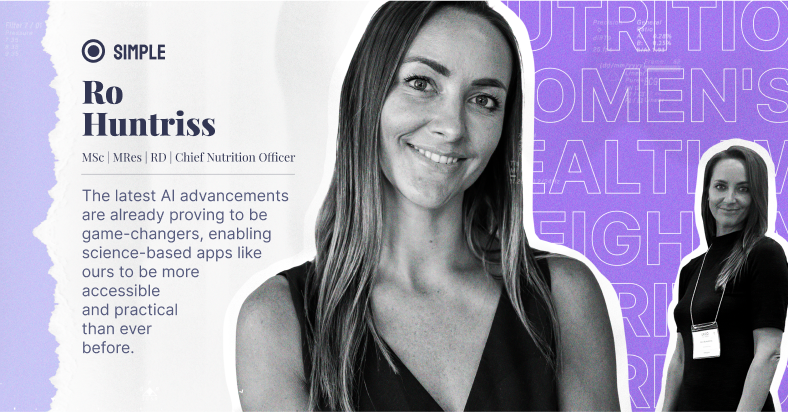
Time to wrap this up — I hope this has inspired you to try something new in your quest for healthier nutrition, and perhaps even to explore the world of science for yourself! For more practical, inspiring wisdom from Krista, Josie, Mariane, and I, check out these articles:
- New Year’s resolutions suck. Unleash the power of practical steps.
- 5 wellness trend predictions to inspire your 2024 goals
- 4 ways to enjoy holiday food with less guilt, anxiety, and stress
And, of course, Avo is always online to answer your wellness questions.
One last (exciting) thing! We’re offering new Simple users a chance to win a 30-minute personalized onboarding session with one of the four of us. If you win, we’ll help you come up with some health goals that make sense for you, and show you how to use the Simple method and app to give you the daily support you need. To enter, fill out this form by Feb 29, 2024. We’re looking forward to meeting you soon!
Ro

